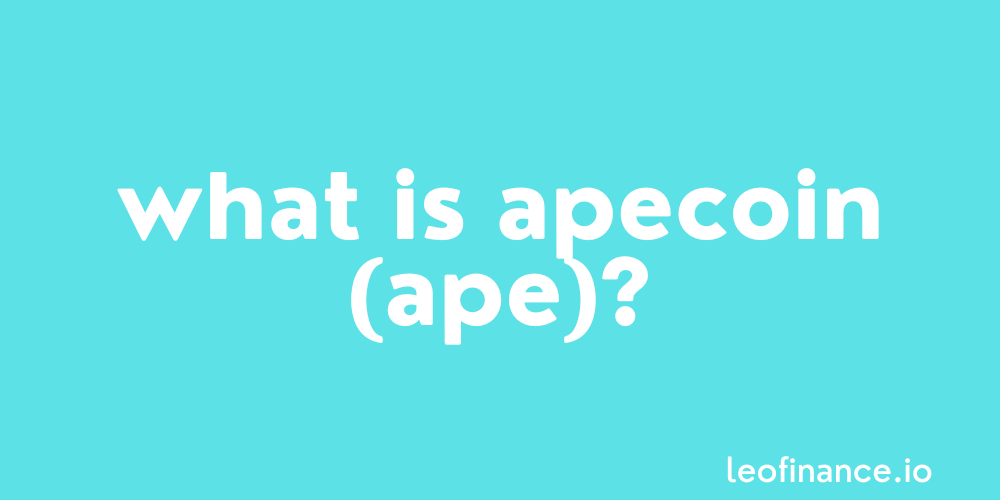
A beginner's guide to ApeCoin, Yuga Labs’ meme coin powering the entire APE ecosystem.
ApeCoin is a cryptocurrency launched by the same team behind the popular Bored Ape Yacht Club (BAYC) NFTs.
The launch of ApeCoin is part of a broader strategy to create an entire APE ecosystem related to the original project.

What sets ApeCoin apart is its unique link to BAYC.
Anyone who buys ApeCoin is eligible to become a member of ApeCoin DAO, a decentralised organisation that will govern how the DAO's treasury is spent and vote on proposals about future projects related to the coin.
In this ApeCoin crypto guide, we’ll go into more detail about the project's origins, technicalities and offer an opinion on its future.
Let’s dive right in.
Introduction to ApeCoin
ApeCoin (APE) is a relatively new cryptocurrency that was launched in March 2022 by Yuga Labs, the team behind the highly successful Bored Ape Yacht Club (BAYC) NFTs.
ApeCoin is part of a broader strategy to create an entire APE ecosystem related to the original project.
It's important to note that even though ApeCoin is affiliated with BAYC and Yuga Labs, technically, it's controlled by ApeCoin DAO.
Yuga Labs claims that they have no ownership over ApeCoin DAO (but as you’ll see in the tokenomics section of this guide to ApeCoin, you need to make up your own mind about the reality of that claim).
This means that ApeCoin holders have a say in the direction of the project, creating a community-driven approach that aligns with the values of decentralised finance.
As we briefly introduced above, anyone who buys ApeCoin is eligible to become a member of ApeCoin DAO, governing how the DAO's treasury is spent and vote on proposals about future projects related to the coin.
This means that ApeCoin holders have a say in the direction of the project rather than the team.
It's also important to note that ApeCoin has its own unique brand identity and use cases beyond its affiliation with BAYC.
While its connection to the popular NFT project may have helped with its initial exposure, ApeCoin has its own ecosystem of projects and initiatives that it is working to build and develop.
These include a decentralised exchange, a lending platform, and a marketplace for NFTs.
While ApeCoin's link to BAYC and the backing of its creators is undoubtedly a significant advantage, some still question how truly decentralised the project is.
With the founders of BAYC and Yuga Labs having a significant stake in ApeCoin and continued allocation of coins, there may be concerns about the influence they wield over the ApeCoin DAO's decision-making process.
Nonetheless, it's still early days for ApeCoin, and only time will tell how the community will shape the project's future.
Which projects make up the APE ecosystem?
The APE ecosystem is a vibrant and growing community of NFT collections who use ApeCoin as the primary token for their projects.
Here are the key NFT projects that currently make up the APE ecosystem:
- Bored Ape Yacht Club (BAYC): Launched in April 2021, BAYC is an NFT collection featuring 10,000 unique digital collectibles of cartoon apes, each with a different look, style, and rarity. Yuga Labs, the creator of BAYC, is a community member in the ApeCoin DAO and has adopted ApeCoin as the primary token for their projects.
- Mutant Ape Yacht Club (MAYC): This NFT collection features up to 20,000 mutated versions of the BAYC Apes and helps onboard new members to the Ape community. Original BAYC NFT holders were given 10,000 mutant serums in three tiers via airdrop to add rarity to their traits.
- Bored Ape Kennel Club (BAKC): Launched in June 2021, BAKC is an assortment of dog NFTs that is available to every single member of the BAYC. Holders of each Bored Ape NFT can adopt a random Club Dog NFT by just paying for gas. BAKC NFTs also have their own rarities.
What is APE crypto used for?
ApeCoin serves several purposes within the APE ecosystem.
As the governance token, ApeCoin allows holders to participate in ApeCoin DAO, governing how the treasury is spent and vote on proposals about future projects related to the coin.
In addition to governance, ApeCoin also acts as the ecosystem's utility token, giving all participants a shared and open currency that can be used without centralised intermediaries.
ApeCoin also provides access to certain parts of the ecosystem that are otherwise unavailable, such as:
- Exclusive games
- Merch
- Events
- Services.
This access is only available to ApeCoin holders, providing them with exclusive benefits within the APE community.
Finally, ApeCoin acts as a tool for third-party developers to participate in the ecosystem by incorporating APE into services, games and other projects.
This incentivisation helps to drive development and innovation within the APE ecosystem.
With developers being rewarded for creating useful and valuable applications.
As you can see, ApeCoin serves as a versatile and multi-functional token, acting as the backbone of the APE ecosystem.
What are ApeCoin’s tokenomics?
ApeCoin is an Ethereum based ERC-20 token that was initially launched with a total supply of 1 billion tokens.
The tokenomics of ApeCoin is designed to be community-driven, with 62% of the tokens allocated to the ApeCoin DAO community.
Of this, 15% was designated for BAYC and MAYC holders, with BAYC holders being eligible to claim 10,094 APE for each NFT they own, and MAYC holders being able to claim 2,042 tokens.
The remaining tokens were released as part of the DAO's "ecosystem fund."
Yuga Labs, the same team behind BAYC, received 16% of the total supply, with a portion of their allocation going to support the primatologist Jane Goodall's charity foundation.
Noble sure.
But not very decentralised.
Another 14% of the tokens were allocated to "launch contributors," defined as the companies and people who helped make the project a reality.
However, the details of these contributors are scarce.
Red flag much?
The four founders of Yuga Labs and BAYC received 8% of the tokens, while the remaining tokens are held as "locked" tokens.
The allocations of Yuga Labs, launch contributors and the founders of BAYC won't be "unlocked" for at least 12 months, meaning they won't be able to sell during that period.
After the 12 months, a certain allotment of tokens will become available to them on a monthly basis, to avoid early token holders from "dumping" their large holdings all at once and tanking the price of the token.
Lol..
Is ApeCoin a meme coin?
Yes, ApeCoin can be classified as a meme coin, much like Dogecoin and Shiba Inu coin.
The value of ApeCoin is largely based on the hype generated by its branding and logo.
The community around ApeCoin has created a strong and loyal following, similar to the community around Dogecoin and Shiba Inu.
While it may not have a clear use case beyond being a utility token within the APE ecosystem, the branding and community around ApeCoin have at least helped it gain significant attention outside of the crypto space.
As with all meme coins, there is a level of risk involved in investing in ApeCoin and before buying meme coins you should do your own research while exercising caution before making any investment decisions.
ApeCoin pros and cons
Here are 5 pros and cons of ApeCoin:
Pros:
- Governance: ApeCoin serves as the governance token for the ApeCoin DAO, providing holders with the ability to participate in decision-making processes within the ecosystem.
- Unification of Spend: ApeCoin is the ecosystem’s utility token, providing all its participants with a shared and open currency that can be used without centralised intermediaries, facilitating seamless transactions within the ecosystem.
- Exclusive Access: ApeCoin provides access to certain parts of the ecosystem that are otherwise unavailable, such as exclusive games, merchandise, events, and services.
- Incentivisation: ApeCoin is a tool for third-party developers to participate in the ecosystem by incorporating APE into services, games, and other projects.
- Strong Community: ApeCoin has a passionate and engaged community of holders who are invested in the long-term success of the project, which can be seen in the active participation in the ApeCoin DAO and the support for the ecosystem's various initiatives.
Cons:
- High Volatility: As with any cryptocurrency, ApeCoin is subject to high volatility, which can result in significant price fluctuations.
- Limited Use Cases: ApeCoin's use cases are currently limited to the ApeCoin ecosystem, and there is no guarantee that it will gain widespread adoption outside of the community.
- Regulatory Risk: There is a risk that regulatory measures could be taken against ApeCoin or the cryptocurrency industry as a whole, which could negatively impact its value and utility.
- Centralisation: ApeCoin's distribution model may be seen as centralised, with a significant portion of tokens allocated to Yuga Labs and the founders, potentially leading to concerns about power imbalances within the ecosystem.
- Technological Risks: The ApeCoin ecosystem is built on the Ethereum blockchain, which is subject to technological risks such as hacks, bugs, and scalability issues, which could negatively impact the project's value and usability.
Should I buy ApeCoin (APE) crypto in 2023?
After evaluating ApeCoin in this guide, it is clear that the project is currently trading on hype rather than a solid foundation.
The value of ApeCoin is largely driven by the popularity of the Bored Ape NFT collection and it remains to be seen whether the longevity of the ecosystem can support its lofty valuations.
While ApeCoin's governance structure and use cases are promising, they are not unique to the project and can be found in other cryptocurrencies with more established track records.
Furthermore, the lack of transparency and clear roadmap from the ApeCoin team is concerning, as it leaves investors in the dark about the project's future development and direction.
Given the speculative nature of ApeCoin and the risks associated with investing in unproven projects, it is difficult to recommend purchasing ApeCoin in 2023.
Instead, investors may want to consider other well-established cryptocurrencies with proven track records and clear development roadmaps.
Check out the rest of our LeoFinance Crypto Guides for better alternatives.
LeoFinance Crypto Guides.
Why not leave a comment below and share your thoughts on our guide to ApeCoin (APE)? All comments that add something to the discussion will be upvoted.
This ApeCoin (APE) guide is exclusive to leofinance.io.
Posted Using LeoFinance Beta
Congratulations @crypto-guides! You have completed the following achievement on the Hive blockchain And have been rewarded with New badge(s)
Your next target is to reach 6000 upvotes.
You can view your badges on your board and compare yourself to others in the Ranking
If you no longer want to receive notifications, reply to this comment with the word
STOPCheck out our last posts:
Support the HiveBuzz project. Vote for our proposal!
Cool
Posted Using LeoFinance Beta